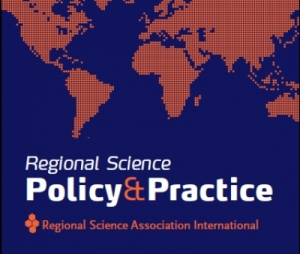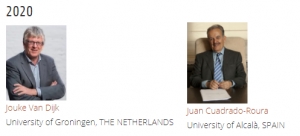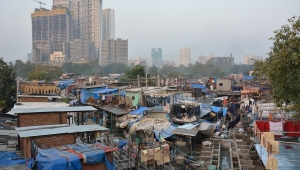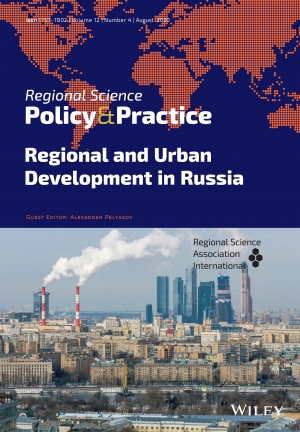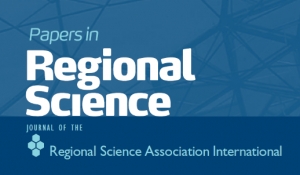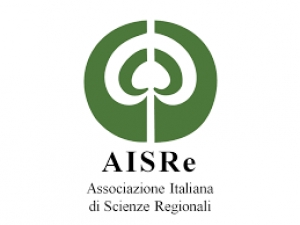Council
Elisabete Martins
APDR2020 | Plenary Session, Thursday, 10 September 2020, live online with Andrés Rodríguez-Pose, Peter NIjkamp and Eduardo Haddad
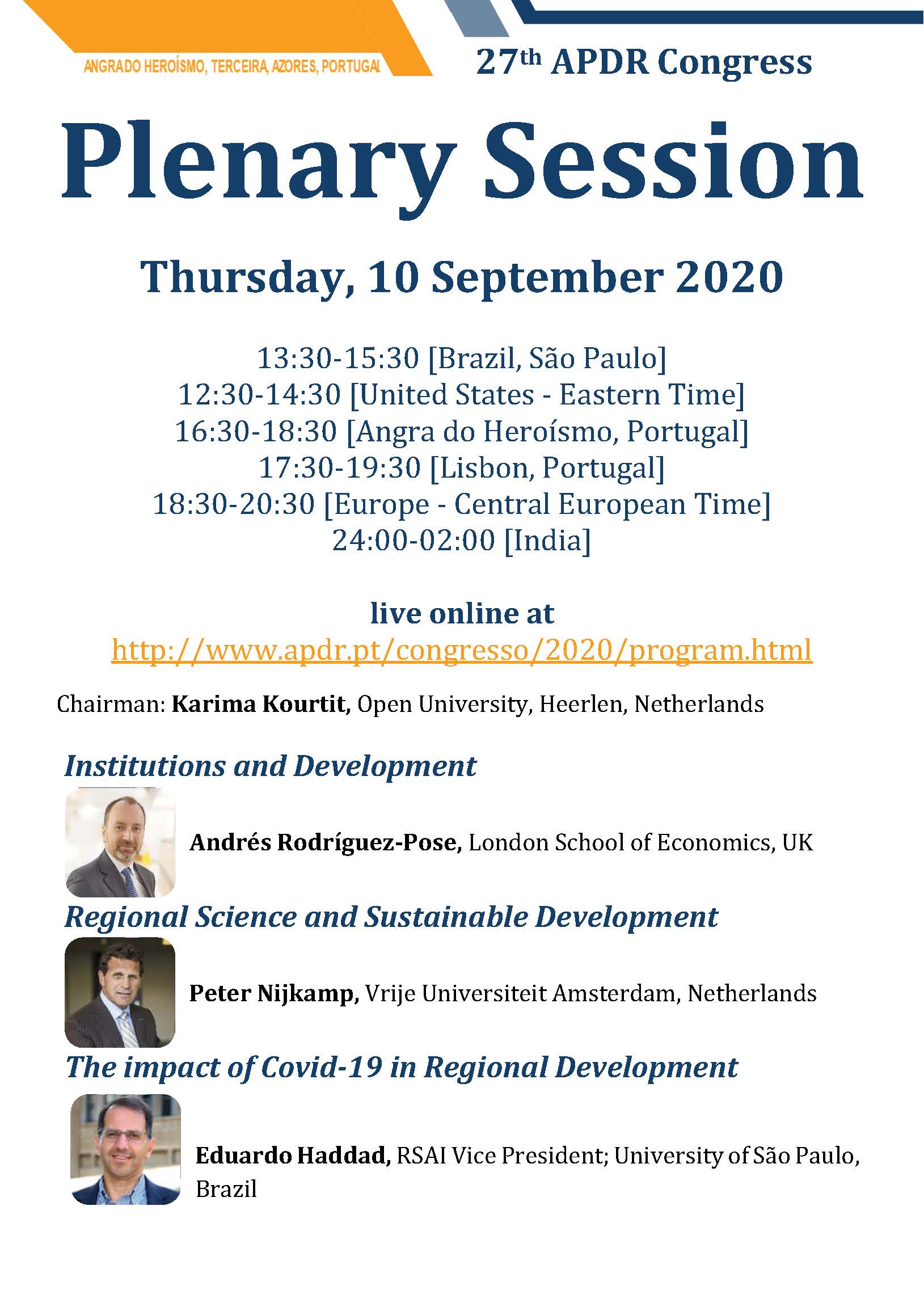 Plenary Session
Plenary Session
Thursday, 10 September 2020
13:30-15:30 [Brazil, São Paulo]
12:30-14:30 [United States - Eastern Time]
16:30-18:30 [Angra do Heroísmo, Portugal]
17:30-19:30 [Lisbon, Portugal]
18:30-20:30 [Europe - Central European Time]
24:00-02:00 [India]
live online at
RSPP Call for Papers | Special Issue on Policy Challenges and Economic Sustainability during Sudden Pandemic Outbreak
Regional Science Policy and Practice
Call for papers
Special Issue Theme: “Policy Challenges and Economic Sustainability during Sudden Pandemic Outbreak”
In the present scenario, a sudden outburst of pandemic diseases can create a profound and serious impact on the global economy, driving policymakers towards finding new and innovative ways to retain economic stability. These diseases when left uncontrolled can initiate a persistent and major-public health problem all over the world with severe consequences. Even with well-determined precaution measures and unremitting lockdown, this sort of epidemic disease often results in a global uncertainty with a huge pressure of the economic crisis. The impacts of this outbreak include economic loss in various forms, which ranges from mortality to the diverse effects on productivity. Here, the most miserable part is that economic loss due to production efficiency and economic returns are considerably greater than the mortality. On the other side, health hazards relating to this epidemic accompanied by fear and panic, further results in numerous economic risks with a complete blockage of global enterprise and supply chain management facilities.
Economic risks due to pandemics are nontrivial and require careful policy planning and control measures. The consequences of the outbreak are highly indeterminate and have various effects on the economy. Certain sectors such as pharmaceutical industries can financially benefit more, while the other sectors may suffer inexplicably. It is inevitable that vulnerable populations especially the poor people become the victim as they have insufficient access to healthcare facilities with reduced income. Several factors such as trade disproportion, exchange rate movement, variation in market interest, and many more confound the process of policy management during a pandemic outbreak. However, the relationship between pandemic diseases and policy uncertainty can be indirect, but it is real. Most of the complex policy uncertainties can be easily tackled, if there is a cooperative response from a range of departments and government organizations. Hence, developing sustainable policies to deal with improved sanitation, provision of clean water facilities, better urban planning, and infrastructures can lead to an ideal solution as they decrease the rate of recurrence of human contact with pathogenic organisms. Eventually, establishing appropriate policies to build stronger health systems and supporting proper nutrition can empower human health with lesser prone to infectious diseases. However, construction of such policies and maintaining economic stability possess a greater amount of risk that impedes the growth of the country. In this context, this special issue intends to bring out various policy challenges and its appropriate solutions to effectively maintain economic stability during the pandemic situation.
Tentative Topics:
- Effective policy planning and outbreak readiness
- Pandemics: risk, impacts, and mitigation over the society and its preventive measures
- Tackling economic crisis during pandemic situations and policy planning
- Policy challenges during pandemic situations and regulatory mechanisms
- Sustainable policy planning with diversely affected economic sectors
- Impact of demographic trends towards policy planning during pandemic situations
- Effective policy planning measures to meet current needs and resources with future requirements
- Policy evaluation frameworks and tools for sustainable policy development during pandemic situations
- Decision making architectures and design methodologies for long-term policy planning and implementation
- Combined effect of economic crisis and infectious disease control measures on economic sustainability
- Disruptions due to pandemic diseases and their financial consequences
Important Date: Webinar with draft papers April 14, 2021
Guest Editorial Team:
|
Lead Guest Editor
|
Name: Dr. Carlos Enrique Montenegro Marin
Affiliation: Professor,
District University Francisco José de Caldas,
Bogotá, Colombia
Official Email ID: This email address is being protected from spambots. You need JavaScript enabled to view it.
Google Scholar: https://scholar.google.com/citations?user=ejJHY40AAAAJ&hl=es
Research Gate: https://www.researchgate.net/profile/Carlos_Marin4
|
Dr. Carlos Enrique Montenegro Marin received the Diploma of Advanced Studies degree from the Pontifical University of Salamanca, in 2008, the M.Sc. degree in Information and Communication Systems from the Universidad Distrital Francisco José de Caldas, and the Ph.D. degree in Systems and Computer Services for the Internet from the University of Oviedo, Asturias, Spain, in 2012. He was classified with the highest recognition of research by Colciencias in 2017 (Senior Researcher). He is the director of the GIIRA research group of the University District, a group that also received the highest recognition by Colciencias. He is currently a Systems Engineer. His skills and expertise are in the areas of Java Programming, Cloud Computing, Web Development, Object-Oriented Programming, Grid Computing, LMS, Virtualization, Software Engineering, and Linux Administration.
|
Co-Guest Editors
|
Name: Dr. Paulo Alonso Gaona Garcia
Affiliation: Professor,
District University Francisco José de Caldas,
Bogotá, Colombia
Official Email ID: This email address is being protected from spambots. You need JavaScript enabled to view it.
Google Scholar: https://scholar.google.es/citations?user=xMe8_CMAAAAJ&hl=es
Research Gate: https://scholar.google.es/citations?user=xMe8_CMAAAAJ&hl=es
|
Dr. Paulo Alonso Gaona Garcia received his Ph.D in Information and Knowledge Engineering in Computer Science from University of Alcalá in 2014 and Masters in Information and Information Sciences Communications, Teleinformatics from Francisco José de Caldas District University in 2007. He was working as Professor and Project Advisor in National Pedagogical University. He is currently working as Director of Engineering Research in Francisco José de Caldas District University. His research and publication topics are in the areas of Internet of Things, ad hoc Networks, Error Statistics, Power Consumption, Quality of Service, Telecommunication Power Management, and Wireless Sensor Networks.
|
Co-Guest Editors
|
Name: Dr. Edward Rolando Nuñez Valdez
Affiliation: Professor,
University of Oviedo,
Oviedo, Spain
Official Email ID: This email address is being protected from spambots. You need JavaScript enabled to view it.
Google Scholar: https://scholar.google.es/citations?hl=es&user=pNT4A7wAAAAJ
Research Gate: https://www.researchgate.net/profile/Edward_Nunez_Valdez
|
Dr. Edward Rolando Nuñez Valdez is working as a Professor at the University of Oviedo in Spain. He completed his Ph.D. from the University of Oviedo in Computer Engineering, Master Degree in Software Engineering from the Pontifical University of Salamanca and B.S. in Computer Science from Autonomous University of Santo Domingo. He has participated in several research projects; He has taught computer science at various schools and universities and has worked in software development companies and IT consulting for many years. He has published several articles in international journals and conferences. His research interests include Web Engineering, Artificial Intelligence, Cloud Computing, Recommendation Systems, Modeling Software with DSL and MDE.
2020 elected RSAI Fellows
2020 elected RSAI Fellows
RSAI is pleased to announce the election of the following Fellows in 2020 - congratulations!
 University of Groningen, THE NETHERLANDS
|
 University of Alcalà, SPAIN
|
In Memoriam: Tönu Puu (1936-2020)
 Professor Emeritus Tönu Puu passed away on July 11, 2020, at the age of 83.
Professor Emeritus Tönu Puu passed away on July 11, 2020, at the age of 83.
Professor Tönu Puu was born in Tallinn, Estonia. Upon the Soviet invasion of Estonia in 1944, he took refuge with his parents and one sister to Sweden. Tönu grew up in Uppsala. From 1956 to 1964, he studied at Uppsala University. He finished his Ph.D. in Economics, with Professor Tord Palander as thesis supervisor. The thesis was awarded the highest mark possible, and Tönu was honoured with a prize named in memory of the economist Erik Lindahl.
Tönu soon became Associate Professor of Economics at Uppsala University. In 1971, he was appointed full Professor of Economics at Umeå University, the first to hold that position. At his retirement in 2001, he became Professor Emeritus at the University’s Centre for Regional Science (CERUM). During his time at Umeå University, both the Department of Economics and CERUM developed into internationally respected research environments.
Tönu’s research spanned over several areas of economics, mathematics and regional science. He served on the editorial board of journals such as Regional Science and Urban Economics, Networks and Spatial Theory, Chaos, Solitons & Fractals, and Discrete Dynamics in Nature and Society. Through his path-breaking work on spatial and dynamic models, often in collaboration with mathematicians in Providence (USA), Munich (Germany), Kiev (Ukraine), Cartagena (Spain) and Urbino (Italy), he became a leading mathematical economist in Sweden. Tönu Puu published about 300 articles and 25 books and worked on new ideas and manuscripts until the end of his life.
Besides his professional life as a professor, Tönu was a many-sided intellectual. He wrote books on art and science, arranged baroque music festivals, built baroque instruments such as viola da gamba and cembalo. His latest project was to build a new virginal (a rectangular harpsichord with the strings stretched parallel to the keyboard, popular in the 16th and 17th centuries), a project he unfortunately could not finish.
Tönu is mourned and deeply missed by us and by many colleagues and friends worldwide. But most of all by his children Margareta and Magnus.
Åke E. Andersson, Johan Lundberg, Inge-Bert Täljedal, Lars Westin
Call PhD Research Grants
We are pleased to inform that CETRAD has an open call, from July 30 to August 28, for the award of the following Research Grants:
- Two PhD Research Grants, in the area of Social Sciences, under the FCT Research Grants Regulation (RBI) and the Research Fellowship Statute (EBI).
The scholarships will be financed by the Foundation for Science and Technology (FCT) under the Collaboration Protocol for the Financing of the Multiannual Plan for Research Scholarships for PhD Students, signed between FCT and the R&D Unit Center for Transdisciplinary Studies for Development (CETRAD) (UIDB / 04011/2020) of UTAD. These grants are available for candidates or students of the PhD in Development, Societies and Territories.
More info about PhD: https://www.utad.pt/estudar/en/cursos/development-societies-territories/
More info about the call: http://www.eracareers.pt/opportunities/index.aspx?task=global&jobId=125444&lang=pt
- One PhD Research Fellowship, in the area of Business Sciences, under the FCT Research Fellowship Regulation (RBI) and the Research Fellowship Statute (EBI).
The scholarship will be financed by the Foundation for Science and Technology (FCT) under the Collaboration Protocol for the Financing of the Multiannual Plan for Research Scholarships for Doctoral Students, signed between FCT and the R&D Unit Center for Transdisciplinary Studies for Development (CETRAD) (UIDB / 04011/2020) of UTAD. These grants are available for candidates or students of the PhD in Agribusiness and Sustainability.
More info about PhD: https://www.utad.pt/estudar/en/cursos/agribusiness-sustainability/
More info about the call: http://www.eracareers.pt/opportunities/index.aspx?task=global&jobId=125430&lang=pt
Note: The candidates must complete the attached application form and send with the respective supporting documents by email: This email address is being protected from spambots. You need JavaScript enabled to view it.
Call for contributions from around the world: For the Book "Accessible Housing for South Asia; Housing needs, implementation and impacts"
Respected Sir/Madam,
Springer plans to publish an edited volume titled “Accessible Housing for South Asia”. Although focusing Housing Issues in South Asia we would like to enlarge the committed contributions from South Asia to authors from other parts of the world, mobilizing their responsibility in the global problem of accessible housing .We strongly believe that your contribution shall significantly enrich the proposed book as well as guide future research, policy and practice in this field.
Relevance of the Edited Volume
This book highlights the major issues related to Urban Housing in South Asia looking at: a) demands and needs in space and time; b) financial capabilities, housing design and implementation; and c) socio economic and environmental impacts of housing. For various case studies the book analysis the process of delivering of houses, the issues related to access to employment, markets and services, the cumulative effects on gentrification, exclusion and spatial justice; the long term outcomes concerning economic, social and environmental sustainability of the urban tissue.
Housing is a basic human need, which many argue, is one of the most important inputs to improve livelihoods. Today, particularly in developing nations, housing is one of the most dynamic infrastructures, attributed mainly to rapid urbanization driven by large scale rural to urban migration. The scale varies but the pervasive presence of inadequate and congested housing, slums and houseless population in urban centres all across the world, bears testimony to the fact that adequate housing is still a distant dream for millions of people. UN-Habitat estimates that as of 2015, “330 million households are financially stretched by housing costs; this number could grow to 440 million by 2025.” The number would be higher if ‘houseless people’ living on the street would be added to this category. The ‘lion’s share’ of absolute housing shortage is in developing nations, mainly in South Asian and African countries. In India alone, 12 million houses are lying vacant across urban India in 2015 as against the official housing shortage of 18 million houses in urban areas. The housing challenge has received UN recognition through its mention in both Millennium Development Goals (MDGs) as well as the recently adopted Sustainable Development Goals (SDGs) which aim to, by 2030, “ensure access for all for adequate, safe and affordable housing and basic services and upgrade slums”. Notwithstanding the varied policy and program response from governments in different countries and endeavours by international agencies, achievements are limited with little or no evidence of large-scale positive impact on the urban housing sector, especially for the working class and the low-income groups. Adequate housing being a cornerstone for social equity and environmental sustainability, its failure is a threat to sustainable urbanization, and a complex challenge. Addressing housing need requires legislative, financial and technical support and involves multiple stakeholders, noting that the task of housing for all does not only entail the additional households created due to in-migration in urban places but also involves rehabilitation of Internally displaced persons and replenishment of housing stock lost to frequently recurrent natural disasters like flood, cyclones and earthquake.
Submission Guideline
- A suitable and brief title not exceeding 15 words in font size 14 should be given.
- Author/authors affiliation is mandatory with their designation, institute, postal address, mobile number and email ID.
- Abstracts should be written within 300 words along with 4 to 5 keywords.
- Submission of manuscript must be in MS-Word format with all four sides 1-inch margin. Manuscript should be typed in Times New Roman with a 12 size and keep line spacing at 1.15.
- Manuscript should contain the statement of problem, objective, research methodology and findings of the work.
- Citations and reference should comply with APA style of referencing. Give example for book and journal.
- Length of the manuscript should not exceed 4000-6000 words.
Submission of abstract/full manuscript must be sent to Prof. Tomaz Ponce Dentinho
- through email attachment (This email address is being protected from spambots. You need JavaScript enabled to view it. )
Time Line of Publication
|
Particulars |
Deadline |
|
Submission of Abstract |
August 31, 2020 |
|
Full Paper Submission |
October 31, 2020 |
|
Revision of the first draft |
November 30, 2020 |
|
Springer will receive the draft of the book |
December 31, 2020 |
|
Final corrections and licenses |
January 31, 2021 |
|
Publication |
March 31, 2021 |
Outreach
The target reader includes academicians (University and College teachers and researchers) and organisations like RSAI (Regional Science Association, International) and RSAi (Regional Science Association, India) and other Regional Science Communities in Pakistan, Nepal, Bhutan, Bangladesh, Maldives and Sri Lanka. Students of Geography, Economics, Regional Science and Spatial Planning (at both the undergraduate and postgraduate levels) shall also benefit from having a concise volume on research, policy and practice on accessible housing in South Asia.
Yours faithfully,
The Editors: Kanika Basu, Amitabh Kundu, Habibullah Magsi, Sumana Bandyopadhyay and Tomaz Dentinho
The latest issue of Regional Science Policy & Practice are available! Volume 12, Issue 4, Special Issue: Regional and Urban Development in Russia, Pages: 553-746, August 2020
|
Regional Science Policy & Practice Pages: 553-746 August 2020 |
ISSUE INFORMATION
Pages: 553-554 | First Published: 09 August 2020
INTRODUCTION
Regional and Urban Development in Russia
Alexander Pilyasov
Pages: 555-557 | First Published: 09 August 2020
ORIGINAL ARTICLES
The sandwich of Russian space: How different spaces differentiate themes in regional science
Nadezhda Zamyatina, Ruslan Goncharov, Alexandra Poturaeva, Alexander Pelyasov
Pages: 559-577 | First Published: 18 February 2020
Spatial development of the post‐Soviet Russia: Tendencies and factors
Evgeniya Kolomak
Pages: 579-594 | First Published: 17 May 2020
Population shrinkage and economic growth in Russian regions 1998–2012
Elena Batunova, Giovanni Perucca
Pages: 595-609 | First Published: 11 December 2019
Qualitative Aspect of the Regional Growth in Russia: Inclusive Development Index
Nadezhda Mikheeva
Pages: 611-626 | First Published: 16 May 2020
Economic and Fiscal Resilience of Russia's Regions
Vladimir V. Klimanov, Sofia M. Kazakova, Anna A. Mikhaylova
Pages: 627-640 | First Published: 14 April 2020
Russia's early developed regions within shrinking social and economic space
Tatiana Nefedova, Andrey Treivish
Pages: 641-655 | First Published: 26 March 2020
Impact of ethno‐demographic structure of the population on performance of the Russian regions
Leonid Limonov, Marina Nesena
Pages: 657-670 | First Published: 03 January 2020
Russian borderlands: Contemporary problems and challenges
Vladimir Kolosov, Alexander Sebentsov
Pages: 671-687 | First Published: 22 April 2020
Nikolay Kurichev, Ekaterina Kuricheva
Pages: 689-703 | First Published: 14 November 2019
Konstantin Axenov, Alisa Timoshina, Alexandra Zemlyanova
Pages: 705-722 | First Published: 22 May 2020
Stepan Zemtsov
Pages: 723-743 | First Published: 25 April 2020
BOOK REVIEWS
Deaths of Despair and the Future of Capitalism. by Case, Anne, and Deaton, Angus
Amitrajeet A. Batabyal
Pages: 745-746 | First Published: 22 May 2020
Letters in Spatial and Resource Sciences, Vol. 13, Issue 2 - New Issue Alert
|
|||||
|
In this issue |
|||||
|
|||||
|
|||||
|
|||||
|
|||||
|
|||||
|
|||||
|
|||||
|
|||||
|
|||||
|
|||||
|
|||||
|
|||||
|
|||||
|
The latest issue of Papers in Regional Science is available! Volume 99, 4 (August 2020)
|
Papers in Regional Science Pages: 855-1161 August 2020 |
ISSUE INFORMATION
Pages: 855-856 | First Published: 03 August 2020
FULL ARTICLES
Patent intensity and concentration: The effect of institutional quality on MSA patent activity
Gary A. Wagner, Jamie Bologna Pavlik
Pages: 857-898 | First Published: 03 February 2020
Interregional mobility and the personality traits of migrants
Daniel Crown, Masood Gheasi, Alessandra Faggian
Pages: 899-914 | First Published: 05 February 2020
Sucharita Ghosh, Emanuele Grassi
Pages: 915-944 | First Published: 22 January 2020
Migration and perceptions of housing availability in Sweden
Adam Tyrcha
Pages: 945-975 | First Published: 12 January 2020
![]() Open Access
Open Access
Occupational concentration and outcomes for displaced workers
Vasilios D. Kosteas
Pages: 977-997 | First Published: 17 January 2020
Environmental Engel curves in Italy: A spatial econometric investigation
Marco Baudino
Pages: 999-1018 | First Published: 24 February 2020
Victor Hugo De Oliveira, João Mário Santos de França, Francisco Mário Viana Martins
Pages: 1019-1043 | First Published: 18 February 2020
Inequality and city size: An analysis for OECD functional urban areas
David Castells‐Quintana, Vicente Royuela, Paolo Veneri
Pages: 1045-1064 | First Published: 20 February 2020
Cross‐city spillovers in Chinese housing markets: From a city network perspective
Yunlong Gong, Jan de Haan, Peter Boelhouwer
Pages: 1065-1085 | First Published: 29 January 2020
Is Gibrat's law robust when cities interact each other?
Vanessa Grüdtner, André M. Marques
Pages: 1087-1111 | First Published: 10 February 2020
Formal and statistical aspects of estimating Okun's law at a regional level
Martin Boďa, Mariana Považanová
Pages: 1113-1136 | First Published: 28 January 2020
Francisco Benita, Serhad Sarica, Garvit Bansal
Pages: 1137-1157 | First Published: 07 February 2020
BOOK REVIEW
Slavo Radosevic
Pages: 1159-1161 | First Published: 24 April 2020
Forthcoming AISRe (Italian Section) Web conference!
In these days the website of the AISRe Web Conference has been activated (https://aisre20.wordpress.com/). There you can access the program, get access to the virtual classrooms and obtain information on how to join the conference.
The Scienze Regionali Lectio Magistralis, the plenary sessions on regional impacts of the COVID pandemic and the strategies for achieving sustainable development, and the one on “Great Minds in Regional Science” will be visible in streaming.
About Us
The Regional Science Association International (RSAI), founded in 1954, is an international community of scholars interested in the regional impacts of national or global processes of economic and social change.


